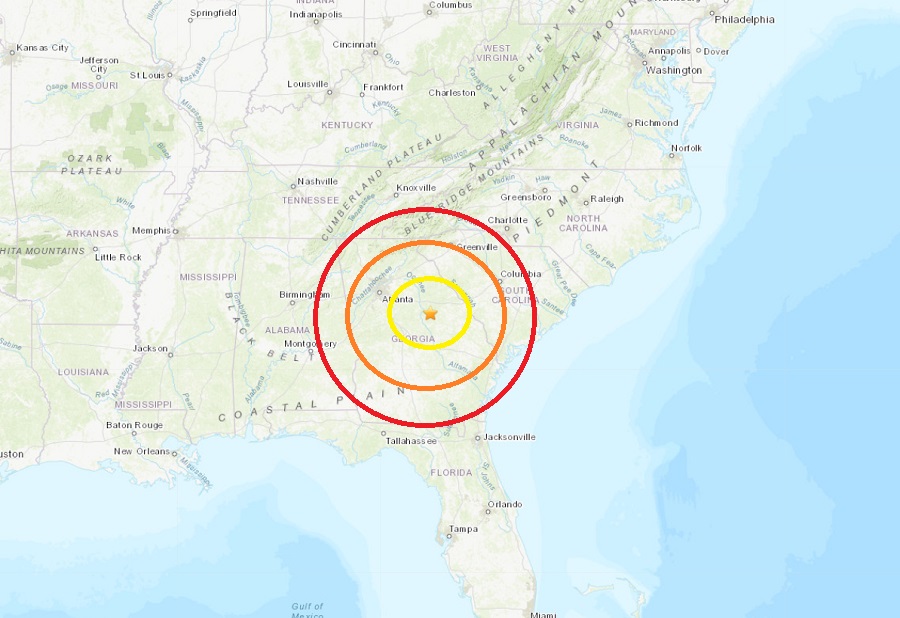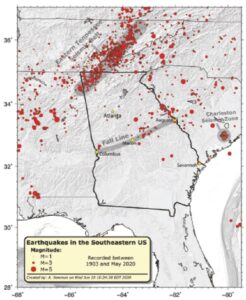
For the third time in the last 7 days, an earthquake has rattled Georgia. According to USGS, a magnitude 2.5 earthquake struck south and east of Atlanta this morning near Sparta, half way between Atlanta and Augusta, and Athens and Macon. The quake hit at 4:30 am this morning and struck from a depth of 10.9 km. While the pair of earthquakes that struck on Friday hit near the Alabama / Georgia state line, today’s earthquake struck in an area with no recent earthquake activity. According to USGS, no measured earthquake of any magnitude struck near the area of this morning’s earthquake in the last 30 days. However, this area did see some earthquake activity earlier this year, with weak to mild events unfolding in this general area 3-4 months ago.
While people used the “Did you feel it?” reporting tool on the USGS website to report they felt today’s earthquake, there have been no reports of any damage or injuries.
Another magnitude 3.9 earthquake event unfolded near today’s epicenter on June 19 last year. That earthquake struck in Candler County, about 7 miles east of Stillmore, Georgia. Even though the earthquake was more than 150 miles away, it was felt throughout the city of Atlanta. While the Tsunami Warning Center’s initial bulletin has the earthquake set as a 4.5 magnitude event, USGS’s first analysis pegged it at 4.2. A subsequent reanalysis of data further reduced the earthquake to a magnitude 3.9 event. USGS says it was felt across a large area because it was so shallow. While earthquakes this strong do strike in the northern portion of the state in and around the mountains, an earthquake of this size is quite rare in southeastern Georgia. The last earthquake within 30 miles of this one with comparable intensity occurred in 2003. That 3.6 magnitude earthquake struck in Cobbtown, Georgia. Before that, there was a 3.7 magnitude event in Hixton which hit in 1976.

According to Georgia’s Emergency Management and Home Security Agency (GEMA), approximately 15 percent of the world’s earthquakes are scattered over areas like Georgia that lack clearly defined active faults. Although earthquakes in Georgia are comparatively rare, scattered earthquakes caused significant damage and are an important consideration for homeowners. Georgia’s northwest counties, South Carolina border counties, and central and west central Georgia counties are most at risk.
GEMA recommends that people in Georgia plan for the risk of damaging earthquakes, especially if they’re in the northern Georgia counties of Bartow, Catoosa, Chattooga, Dade, Fannin, Floyd, Gilmer, Gordon, Murray, Pickens, Rabun, Towns, Union, Walker, and Whitfield, the South Carolina border counties of Burke, Chatham, Columbia, Effingham, Elbert, Lincoln, Richmond, and Screven, and central and west-central counties of Twiggs, Bibb, Jones, Baldwin, Hancock, Greene, Putnam, Butts, Jasper, Newton, Morgan, Walton, Harris, and Muscogee.
GEMA writes, “It’s important to be aware of your earthquake risk and to know how to protect yourself.” They encourage people to take a moment now to learn basic steps they should take before, during, and after an earthquake.